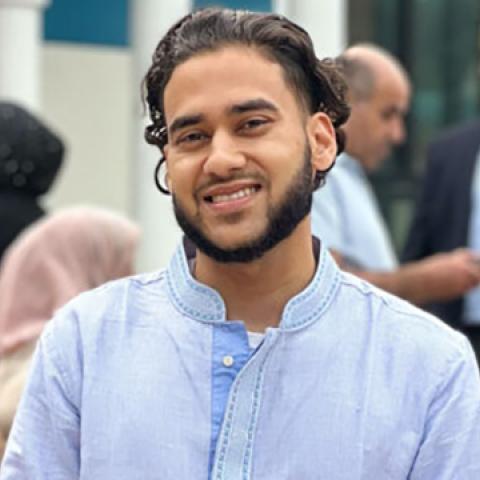After completing his bachelor’s degree, Zubin Khan spent several years giving students direction as a high school counselor in Detroit. But despite the wise advice he gave, he still hadn’t found his own calling.
Khan had begun his undergraduate studies at Eastern Michigan University planning to complete a pre-med program. But along the way, he started to feel as though that was his parents’ dream for his career, not his own.
After his post-grad time as a counselor and a stint with AmeriCorps, Khan paused to reconsider his future—a pause made possible by the COVID-19 pandemic. It turns out, he was passionate about healthcare after all. But instead of going to medical school, he opted to enter the Physician Assistant (PA) Program at Case Western Reserve University.
Now entering his second year in the program, Khan remains grounded in his passion for education, pursuing opportunities to incorporate his background into his studies. Earlier this summer, Khan contributed to a PA program initiative that brought high- and middle-school students from Breakthrough Public Schools to campus for a day to expose them to careers in medicine.
The program took Khan back to his past career—reflecting fondly on the memories.
“You remember the talent shows, the field trips, the graduation parties, the relatives, you remember it all,” he said. “I still remember students calling their parents and crying because they just realized they could afford to go to their dream college.”
We spoke with Khan to learn more about what it was like to work with high school students again and where he hopes to take his career from here.
Answers have been edited for length and clarity.
1. What drew you to Case Western Reserve University?
Frankly put, I was looking to enroll into the best possible program I could get into. I was already aware of how reputable the medical school program was, and I was interested in going to the school that would challenge me the most. Besides the academics, I also took notice of how Case [Western Reserve]’s program seemed to have more diversity than many other PA programs I was researching.
2. Why did you decide to start the physician assistant program?
I was interested in pursuing a career that would push me to learn for a lifetime. I often felt replaceable in my previous jobs, and I hated that feeling. One of the best things about being a PA is that it is your actual job to help people get better. Not many jobs share that in common.
3. What has your experience been like in the PA program so far? Have you had any particularly rewarding or otherwise special moments?
I’ve enjoyed the moments when I would be studying wondering if I could possibly learn all the material before the upcoming exams. As strange as it may seem, you start to long for those moments of the unknown from school after working for a while. This time around in school, I’ve been much better at sinking into the thrill of the uncertainty. Probably the most special moments have just been the times bonding with my classmates. We’re a small program, and it’s much easier to become close with 35 people than it is with 200 people. It also helps that Case [Western Reserve] is a national program, so I’ve been able to befriend people from all over the country (and even one from over the border!).
4. What is it like to share your career interest with youth at the event with students from Breakthrough Schools?
When you’ve done something for long enough, it simply just becomes a part of who you are. I’m not a big believer in being the spark that makes a kid completely change their life around after one conversation with me. I don’t think people are like that.
I think people are long, difficult projects, that takes an incredible amount of patience if you ever hope to make even one chip to their sculpture. I don’t mind the frustration that comes with watching people take one step forward and two steps back.


